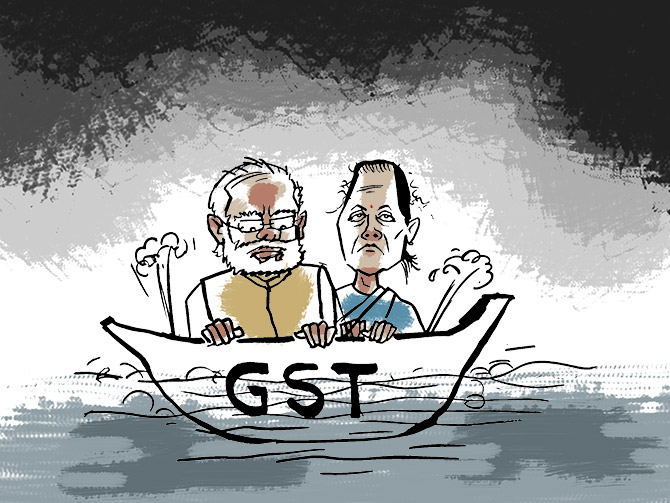 | « Back to article | Print this article |
Retaining the GST rate assumes importance since states are under pressure to increase their revenues, hit hard by lockdown.
Also, the Centre has not fully compensated states for their revenue losses on account of GST for 2019-20.

Top government officials recently hinted that the finance ministry may not push for hiking Goods and Services Tax (GST) rates on non-essential goods in a bid to bolster demand in the economy.
The GST Council is set to hold its first meeting in June after a national lockdown was enforced by the government on March 25 to curb the spread of the novel coronavirus.
“The demand for all goods, especially non-essential items, has to be induced. Tax-related measures will be taken up for discussions in the GST Council meeting.
"After the lockdown is lifted, economic activity has to improve on all counts.
"Though demand for essential items hasn’t been affected much,” a top government official said, requesting anonymity.
But the government will have to find ways in which essential and non-essential items can be segregated.
The present lockdown norms, which have considerably allowed economic activities, were in force till May 31.
Retaining the GST rate assumes importance since states are under pressure to increase their revenues, hit hard by lockdown.
Also, the Centre has not fully compensated states for their revenue losses on account of GST for 2019-20.
Compensation is to be released to states on a bi-monthly basis.
However, due to the falling GST compensation cess collection, the Centre held back fund transfer to states beginning August.
Following this, states raised the matter with the Centre, and in December 2019, Rs 35,298 crore was released as compensation for August-September.
Also, Rs 34,053 crore was released in two instalments in February and April as compensation for October-November.
On the other hand, industries such as automobiles are demanding cut in the GST rates to increase their sales.
After easing curbs on economic activities, the government’s feedback from the industry is that in manufacturing hubs, factories are operating at 20-35 per cent capacity.
“Economic activity is beginning to start slowly.
"There is difficulty in terms of bringing back the workforce but business models are being re-cast in such a manner that they are now hiring locals at higher cost, offering them some incentives,” the official said.
The labour and employment ministry is gathering data on the potential job loss as a result of the national lockdown enforced in March and it will hold discussions with the state governments on mobilising on how to bring back the migrant workers to factories, the official said.
The government is not ruling out monetising the fiscal deficit.
“We will try to cross that bridge when it comes,” the official said, on being asked if the government is considering monetisation of fiscal deficit.
With revenues dipping and expenditures rising, the Centre's fiscal deficit is expected to cross five per cent against 3.5 per cent pegged in the current financial year. Also states have been given leeway to increase their fiscal deficit till 5 per cent with some riders.
Even as the Centre has increased its proposed market borrowings by Rs 4.2 trillion for FY'21, many experts believe that this would not be enough and the RBI will have to directly buy the government bonds or in other words monetise the fiscal deficit which means printing more currency notes.
The official explained that the government had weighed the option of cash transfers while announcing the economic stimulus package, which was officially pegged at Rs 20 trillion, but decided against it due to large possible exclusions.
“We wanted the money to reach a point which triggers economic activities,” the official said.
The government is actively discussing the idea of a ‘bad bank’ which was also taken up briefly in the Financial Stability and Development Council (FSDC) meeting chaired by Finance Minister Nirmala Sitharaman on Friday.
“Though it is being regularly discussed but the idea has not moved forward,” the official said.
State Bank of India chairman Rajnish Kumar had said earlier in May that banks are discussing the idea to create a ‘bad bank’ in the form of an asset reconstruction company to deal with stressed assets.
The FSDC meeting also discussed ways in which the Securities and Exchange Board of India can bring in systematic reforms to bring down stock market volatility.
“If you look at the recent SEBI circulars, it took measures to curb speculative trade.
"More steps will be taken on those lines,” another finance ministry official said.
It discussed ways in which domestic investors can be given some support and how international investors can connect with joint venture partners in India.